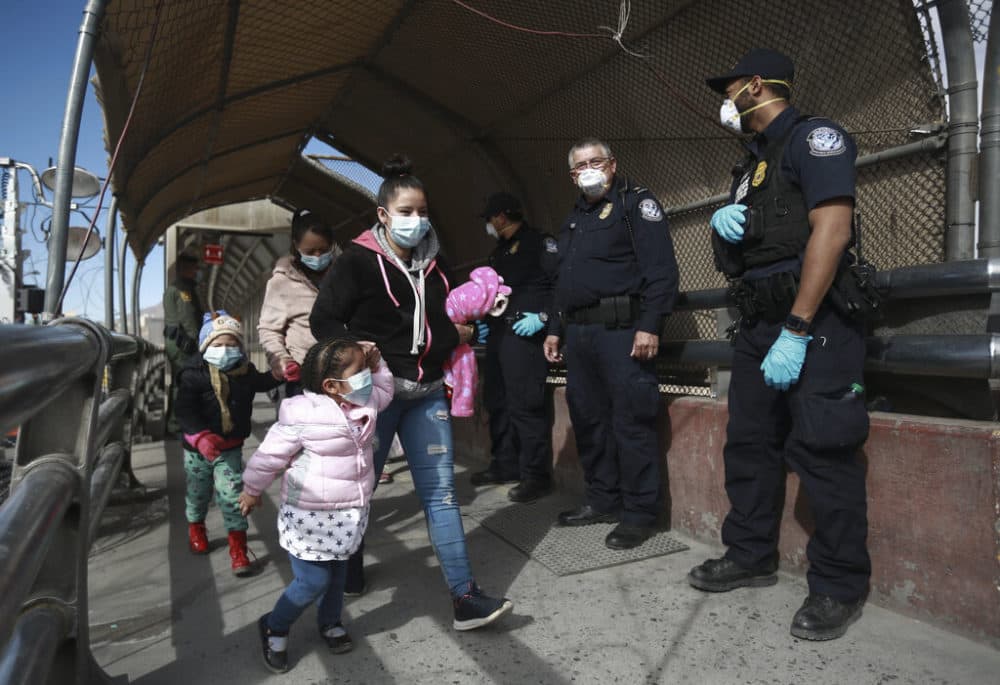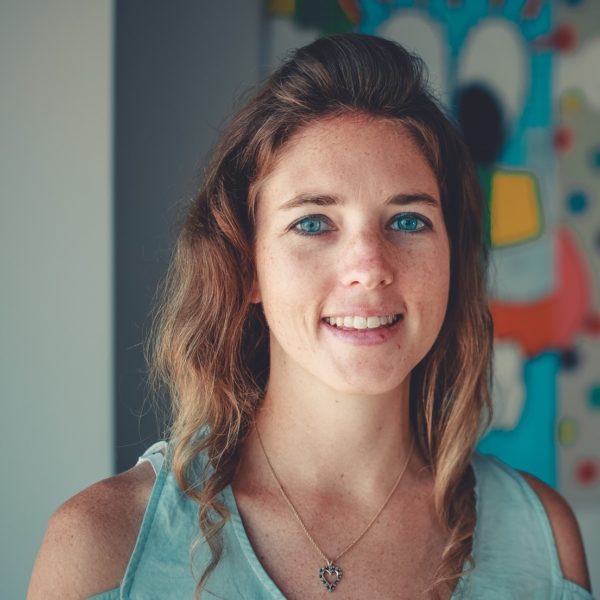Advertisement
The legacy of Title 42
Resume
Sign up for the On Point newsletter here.
A controversial immigration policy meant to keep COVID-19 out of the U.S. is set to end next month.
Title 42 stopped asylum seekers from entering the United States. But some experts say COVID-19 cases — and border crossings — actually went up.
"Title 42 is like an effort to tread water until things get better. But very clearly, Title 42 has made things worse," Aaron Reichlin-Melnick says.
Thousands of migrants were left stranded, unable to go back home.
"We've tracked nearly 10,000 cases of asylum seekers and migrants who've been subjected to kidnappings torture, rape and other brutal attacks during the time that the Biden administration has been in office due to the Title 42 policy," Eleanor Acer says.
But despite claims of the policy causing a humanitarian crisis, U.S. lawmakers claim lifting Title 42 will cause a different crisis here at home.
Today, On Point: The legacy of Title 42.
Guests
Eleanor Acer, director of the Refugee Protection program at Human Rights First, where she oversees research and advocacy on issues relating to refugee protection, asylum, and migrant rights. (@AcereEleanor)
Aaron Reichlin-Melnick, senior policy counsel at American Immigration Council. Author of A Guide to Title 42 Expulsions at the Border and Ending Title 42 and Creating an Orderly Asylum System. (@ReichlinMelnick)
Harold Koh, former senior advisor on the State Department’s legal team under Biden. Professor of international law at Yale Law School. In an internal memo, Koh called the use of Title 42 “illegal” and “inhumane.” (@haroldhongjukoh)
Monette Zard, director of the program on Forced Migration and Health at Columbia’s Mailman School of Public Health. (@MonetteZard)
Also Featured
Honduran woman seeking asylum in the U.S. who was expelled to Mexico due to Title 42.
Transcript: Highlights From The Show’s Open
KIMBERLY ATKINS STOHR: It started on March 20th, 2020, at the very start of the COVID pandemic.
PRESIDENT DONALD TRUMP [Archival Tape]: To confront these public health degrees, the Centers for Disease Control and Prevention has decided to exercise its authority under the Title 42 of the U.S. Code to give customers of Border Protection the tools it needs to prevent the transmission of the virus coming through both the northern and the southern borders.
ATKINS STOHR: Under Title 42, President Donald Trump essentially closed the U.S. border to all migrants, including asylum seekers. Title 42 is a public health statute that dates all the way back to 1893, when the U.S. wanted to stop the spread of cholera by regulating shipping containers coming into the country.
The statute was then revised in 1944, giving the federal government the authority to suspend entries and imports in order to prevent the spread of disease. It has been used very few times and never quite like this.
JOE BIDEN [Archival Tape]: You come to the United States and you make your case that I seek asylum based on the following on the following premise. Why I deserve it Under American law. They're sitting in squalor on the other side of the river.
ATKINS STOHR: That was Joe Biden during a presidential debate against Donald Trump back in October 2020. In April 2020, then U.S. senator and now vice president Kamala Harris signed a letter to the Trump administration, asking them to end the policy. Stating, quote: 'This amounts to a startling expansion of executive power under the guise of a global pandemic response.'
So, many people thought when Joe Biden and Kamala Harris won the presidential election in 2020, Title 42 would quickly be lifted.
NEWS BRIEF [Archival Tape]: The Biden administration is keeping a controversial Trump era policy on migrants intact, which opponents say could put asylum seekers in danger.
ATKINS STOHR: And it stayed on the books month after month after month, even when COVID cases dropped and many restrictions were lifted. Title 42 stayed in place, the reasoning, the CDC said so. Here's White House Press Secretary Jen Psaki.
JEN PSAKI [Archival Tape]: We don't see Title 42 as an immigration policy. It is a public health authority because we're still in the middle of a pandemic and it is determined by the CDC.
ATKINS STOHR: And here's Secretary of Homeland Security Alejandro Mayorkas.
ALEJANDRO MAYORKAS [Archival Tape]: It is not an immigration policy. It is not an immigration policy that we in this administration would embrace. But we view it as a public health imperative, as the Centers for Disease Control has so ordered.
ATKINS STOHR: Meanwhile, many in the CDC, including Dr. Anthony Fauci, the country's leading expert on COVID, seem to think expelling migrants isn't a quote 'solution' to an outbreak.
DR. ANTHONY FAUCI [Archival Tape]: I mean, if you just look at the data and look at the people who've gotten infected, look at the people who are in the hospital, look at the people who've died. This is not driven by immigrants. This is the problem within our country. The same way it's a problem with other countries throughout the world. Certainly, immigrants can get infected, but they're not the driving force of this. Let's face reality here.
ATKINS STOHR: Under the Biden administration, some restrictions have been lifted. Here's White House Press Secretary Jen Psaki again.
JEN PSAKI [Archival Tape]: There are several exceptions for Title 42, including those who are fleeing persecution who express a concern of fear.
ATKINS STOHR: But whether these exceptions are actually being implemented on the border is hard to say. We spoke to a woman seeking asylum on the southern border. She says exceptions to Title 42 have not been made for her. Maria is from San Pedro Sula in northern Honduras. It's one of the most dangerous cities in the entire world.
We're not using Maria's real name since she is in fear of her and her family's lives. Maria left Honduras with her three kids, ages 15, 11 and four, in June of 2021 after a powerful gang member threatened to kill them. Maria does not speak English, so we spoke to her through an interpreter named Martha.
MARIA [Translation from Martha]: I had already had issues with these people because this lady's brother fell in love with my daughter. She was around 12 years old at that time, and I said to the lady that I was going to accuse him before the police, and he told me that if I did anything against her brother, she was going to have us killed.
ATKINS STOHR: Knowing her life was in danger, she packed up her things and fled. She headed for the U.S., where her oldest son lives in California. But she knew the journey wouldn't be easy. She'd have to travel hundreds of miles, through places that weren't safe.
MARIA [Translation from Martha]: When we were in Mexicali, we were detained by some people that were holding us against knives and telling us that we had to pay for a ransom if we wanted to keep going. And my son had to pay for them to let us go.
ATKINS STOHR: Finally, they got to the U.S. border in November and tried to seek asylum at the Port of Entry in Calexico, California. She was held by U.S. immigration officials for two days.
MARIA [Translation from Martha]: They told me they were not going to let me talk. I was trying to speak with them and tell them that I was afraid for our lives, especially my 15-year-olds' life. Because there they steal the children, they steal the girls. They held me for two days with my children, and they gave us just a burrito and some water and threw us without clothes, all dirty back at Mexico. And my children were crying, they were crying out of hunger.
ATKINS STOHR: Maria was dropped off at San Luis Río Colorado in Mexico with her three children. Three hours from where she crossed the border to a place she'd never been before. Without any food, water or even the belongings she arrived with. No shelters in town would take them, so they slept on the sidewalk.
Maria was able to get a hold of her son back in the U.S., who gave her money to take a bus to Tijuana, where there were more shelters available. Finally, she was able to find a safe place through a local church, but outside the shelter was a very different story.
MARIA [Translation from Martha]: Once in the afternoon I was going for see me with my girls and we saw men. They had guns. I don't know if they were trying to hijack us or what. I went into the pizza place with my younger daughter. And my older daughter did not move.
And I kept telling her, They are going to kill you. Come inside or they are going to kill you. I went outside again. They were pointing at her, at her stomach and her forehead. And after that, we didn't go out, out of shelter for a very long time. I am very, very scared to leave the shelter.
ATKINS STOHR: Maria has been in Tijuana since November. It has been almost a year since she fled her home. She says she knows she will be killed if she goes back. The only option she has now is to wait.
Wait until Title 42 goes away and she can finally seek asylum.
MARIA [Translation from Martha]: They should at least give us the opportunity to fight for our children. In our countries, they recruit minors. They recruit the boys and teach them how to kill. And the girls, they take them away from your hands to rape them. I love my children and I really wish the Title 42 would disappear so that we can fight for a better life.
Related Reading
Columbia's Program on Forced Migration and Health: "Epidemiologists and Public Health Experts Reiterate Urgent Call to End Title 42."
Human Rights First: "Tracker of Reported Attacks During the Biden Administration Against Asylum Seekers and Migrants Who Are Stranded in and/or Expelled to Mexico."
Columbia's Program on Forced Migration and Health: "Public Health Recommendations for Processing Families, Children and Adults Seeking Asylum or Other Protection at the Border."
This program aired on April 20, 2022.

